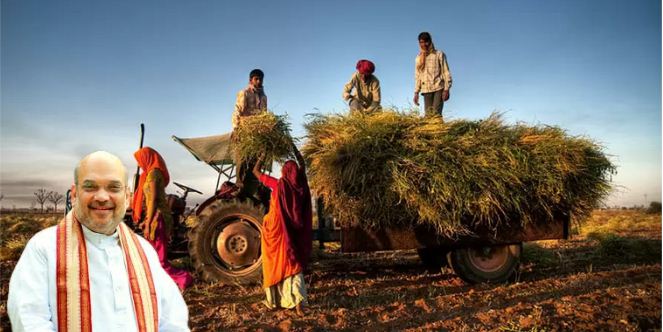- The Ministry of Co-operation was formed in July, 2021 to decouple cooperatives from Ministry of Agriculture & Farmers Welfare
- Amit Shah announced to introduce new cooperative policy, which will strengthen farmers
- Cooperatives have been big part of India’s growth story and now they are ready to take up not just lending, but also various multi-sectoral challenges
Post-1947 India has seen thousands of farm welfare schemes designed by our think tanks and launched by our policymakers. Despite humongous efforts, Indian farmers are the most vulnerable section of our economy. Bureaucratic corruption is said to be the main reason behind the poor state of our farmers.
New policy for strengthening cooperatives
The newly created Ministry of Co-operation headed by Amit Shah is prepared to remove the bureaucratic monopoly in the farm sector. Addressing the first national cooperative conference in Delhi, Amit Shah announced that the centre will soon involve cooperatives in implementing various farm schemes. Highlighting the importance of Primary agriculture co-operative societies (PACS), he said-“There is a role for PACSs in running many farm-related schemes like electronic national agriculture market (e-NAM) and soil health card scheme. Benefits of all these schemes will reach the ground level when PACS is made implementing agencies at village levels”. He added that the proposal to convert PACS into a farmers’ producer organization is under consideration.
Explaining how the Modi government is proactively working to promote cooperative societies, he said that the government is working on creating a legal framework for increasing the number of PACS from 65,000 to 3, 00,000. He further added that cooperative societies which until now mainly acted as the lender for farmers will be converted to being a multi-service center. These multi-service-focused cooperatives will be a one-stop solution for farmers, where they will be able to avail not just loans, but additionally the information about schemes and other goods and services. There is a plan to amend the multi-state cooperatives act 2002, to facilitate the functioning of multi-state cooperatives.
Cooperatives-A catalyst in India’s growth story
Cooperatives have been one of the biggest change-makers for India’s agriculture sector. Their role in harnessing the Green Revolution is paramount. Amit Shah himself mentioned how IFFCO, a multi-state cooperative society played a key role in the success of the Green Revolution. The success of IFFCO in the green revolution has been particularly amplified by huge margins in the white revolution. Right now, India possesses 1, 94,195 co-operatives in the dairy sector. According to the 2019-20 annual report by the National Dairy Development Board, these daily cooperatives had procured 4.8 crores litres of milk from 1.7 crore members. They also sold 3.7 crores litres of liquid milk per day. In the sugar sector, cooperatives are responsible for the production of more than 35 per cent of the total sugar produced in the country.
Cooperatives play a big role in influencing the agricultural growth of our country. Most Indian farmers have extremely low literacy rates, so it becomes difficult for them to deal with bureaucracy. Their problems get exacerbated when they go to avail farm loans from the banks. PACS coordinates with these farmers and compile data regarding their requirements. These PACS then report to district central cooperative banks (DCCBs), from where short-term loans are sanctioned. At the top of the lending hierarchy are state cooperative banks (SCBs) which mainly finance agri-processing industries such as sugar mills or spinning mills.
In its annual report of 2019-20, NABARD estimated a total of 363 DCCBs and 33 state cooperatives in the country. The report highlighted that the DCCBs sanctioned short-term loans worth Rs 3, 00,034 crores in 2019-20, while state cooperative banks sanctioned Rs 1, 48,625 crores in loans.
Farm laws and cooperative policy to end corruption
The agriculture sector has recently been getting freed from the clutches of corrupt bureaucracy. Earlier, farmers mainly used to sell the produces to agriculture produce market committees (APMC) at the fixed price. Even that process involved a middleman called Arahatiya, who used to take in a major chunk of farmer’s income. The new farm laws by the Modi government have given the farmers their well-deserved opportunity to sell their products to anyone they want, outside the APMC.
Read more: For the first time, a government in India is trying to differentiate real farmers from fake farmers
A complex process involving bureaucracy makes it difficult for farmers to avail information about the benefits of the government schemes. Strengthened cooperatives will not only help in counselling the farmers about their crops, but they will be highly effective in the simplified lending process.
